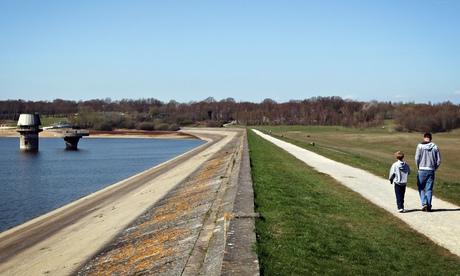
Zoe Williams puts forward an extraordinary argument (There’s plenty more space for humanity on this ‘tiny’ island, 2 November). She suggests that because “only” 10.6% of England’s land area is urbanised there is room for a great many more people than currently live here. This ignores lots of things, but let’s focus on one: food.
Despite an intensive agriculture that depends heavily on pesticides, fertilisers and diesel fuel for tractors, neither England nor the UK is self-sufficient in food. In fact we import 40% of our food, and the proportion is rising. That might not matter if we could be sure that we’ll be able to import food in increasing quantities.
But we can’t. All round the world the human population is rising and becoming more prosperous. People want more food and, particularly, more meat. All this increases the pressure on food supplies. Meanwhile climate change is likely to reduce food production.
We may, of course, get lucky. There may be an amazing breakthrough in agriculture or the ability to make food in factories. But the possibility of a breakthrough is no basis for a sane policy. We must base policy on the expectation that food imports will become more expensive and less available. And on that basis increased numbers really are a problem, both here and globally.
David Flint
London
• Quite where does Zoe Williams think people are going to live? Greater London, south-east and eastern England, with a mid-2014 population of 21.8 million, excluding Suffolk and Norfolk, already has a population density of over 700 people per sq km, compared with about 500 in the Netherlands. The chalk aquifers of southern England are already one of the most water-stressed regions in the developed world, and we are lucky the last drought ended just in time for the London Olympics, as we were months away from standpipes.
Rather than playing to petty xenophobia, a smarter government would be demanding substantial EU structural funds to help adjust to the costs of massive net inward EU migration with regional development and greatly enhanced railway infrastructure. Otherwise the social costs will be immense in an increasingly unequal, low-tax, low-skill economy: the rise of the BNP and now Ukip did not come out of the blue. Unless we bring taxation and public spending up to at least German levels, I fear things will turn very nasty in a dog-eat-dog world, whether or not we choose to leave the EU.
David Nowell
Fellow of the Geological Society
• Zoe Williams’ excellent piece deserves a medal for telling us, in a world of distortions, the truth about migration and also reminding us that welcoming the stranger is essential for our growth as human beings. One result of successive governments failing to support or, like the present one, attacking trade unions is that the people who pay low wages ride roughshod, unopposed. But fortunately, due quite likely to the pandering by Ukip and the Tories to the rightwing media and its anti-immigrant propaganda, recruitment of volunteers to organisations such as Refugee Network Support has never been higher. The real Britain shining through.
David Murray
Wallington, Surrey
• It is curious to see someone like Zoe Williams, who normally tacks to the left, marshalling some of the most reactionary tropes in support of population growth: the supply of living space has never been higher, there are plenty of jobs, and there is no low-wage problem. It is of course important that migrants are not scapegoated; but such pious deceit from comfortable middle-class commentators can only provoke the unemployed, the low-paid and the homeless.
Peter McKenna
Liverpool
• Population growth, like climate change, leads to much heat under collars and many attempts to deny or reduce its importance. The UK’s population rise is inextricably linked to the world’s (7 billion now, 9-11 billion likely by the end of this century). Six moderate letters (2 November) point out the dangers. Zoe Williams conflates the issue of population rise with immigration; but she unwittingly gives the game away when she lets slip that “Most of the natural world needs to be left unmolested”. It certainly does, but it cannot be allowed to regenerate while the human part of it requires so much of its resources.
The whole argument tends to be sterile for most people as they feel they cannot do anything about it. Yet there is a great deal that individuals can do. They can, most importantly, create an atmosphere in which the issues can be discussed calmly and they can encourage small families. Religious people who use contraceptives, but whose church denies their use to poorer people, could make more fuss about the ban. (European governments, with the honourable exception of the UK, do not allow their foreign aid to be used for contraception.) Developing-world charities which do likewise should also be challenged. We could look to our own family planning services, which, like the rest of the NHS, are struggling.
Purely voluntary methods of reducing population growth have worked for many countries. There is no need to follow the path taken by China.
Helen Haran
St Albans, Hertfordshire
• Join the debate – email guardian.letters@theguardian.com







